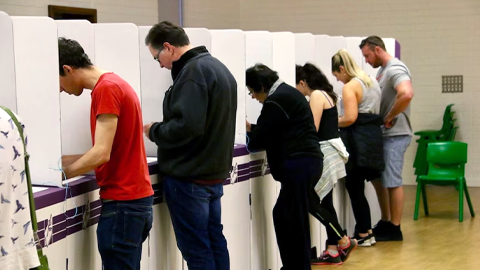The Voice to Parliament Referendum
What is a Referendum, and why is it important?
![]()
The Voice to Parliament referendum has been announced, and the Referendum will be held on Saturday October 14, 2023. It will be a historic moment in our nation’s story. Referendums empower citizens to shape the future, address a crucial issue, and make progress. In Australia, referendums have paved the way for societal advancements, and have even corrected historical injustices of the past.
We know that decisions like this are important to young people, just as they are for the adults who will vote. This resource has been prepared to guide Units in exploring the themes that sit at the Statement from the Heart.
What is a referendum and how is the result decided?
A referendum is a compulsory national vote on a proposed change to the Australian Constitution. It requires approval by what is known as a “double majority”. That is:
- A national majority of voters (more than 50% from all states and territories), and
- A majority of voters (more than 50%) in a majority of states (at least four of the six states)
The last referendum was held in 1999, which means that no one under 42 years old has ever voted in one! That’s a whopping 8.5 million people!
To learn more about referendums, visit this link.
To find out what a constitution is, visit this link.
What’s this referendum all about?
So, what’s meant by an Indigenous Voice to Parliament?
The Voice would be an independent and permanent advisory body. It would give advice to the Australian Parliament and Government on matters that affect the lives of Aboriginal and Torres Strait Islander peoples. This would be as an advisory body, with no powers to overrule parliament. You can read the question and the proposed amendment here.
Why is it important to understand the referendum?
Scouting exists to develop young people into active participants in their local, national and international communities. Having respectful conversations and understanding the significance of a constitutional referendum aligns with this mission.
How can you learn more about it?
In Scouting, the program is set by young people through a process we call “youth leading, adult supporting”. We encourage Units to learn more about the referendum by building into their program information and discussion about it (see some suggestions below). -Or, simply for members to do some research in their own time. Some resources to get started are below:
- The Voice Referendum website from the Australian Government (the initiators of the referendum): The Voice
- The Australian Electoral Commission are required to distribute a pamphlet to Australian voters, containing the Yes and No cases, prepared by parliamentarians who have voted for and against the proposed law. You can read the cases here: Yes/No case pamphlet – Australian Electoral Commission (aec.gov.au)
This is also an important time to be aware of misinformation and to learn about critical media literacy. Bogus claims can go viral on social media, and even the Yes/No pamphlets (linked above) have been criticised for making false or incomplete statements. Several organisations are working to debunk misinformation (eg. RMIT Fact Check, the AAP, and The Conversation).

Some ways your Unit can learn more:
- Host a debate/discussion night
- Watch some YouTube videos about the referendum, and then have a discussion
- Explore and learn about the Uluru Statement from the Heart
- Visit some places of local Indigenous significance and learn their stories
- Visit question time at your State/Territory/Federal parliament to see how laws are made. For Federal Parliament you can watch on ABC iView
- Invite a lawyer from a local law firm to discuss what a referendum is, what a constitution is, and how changes are made
